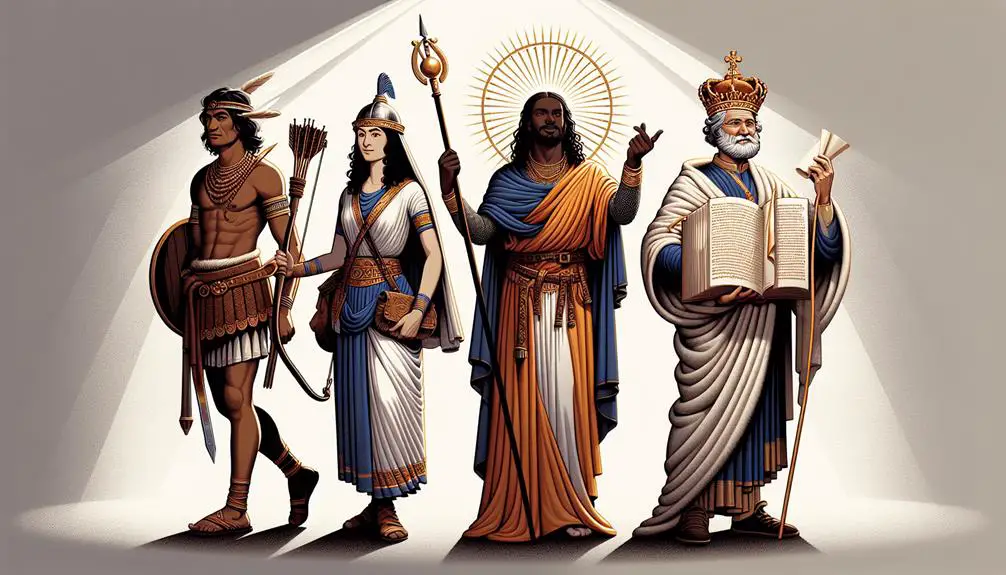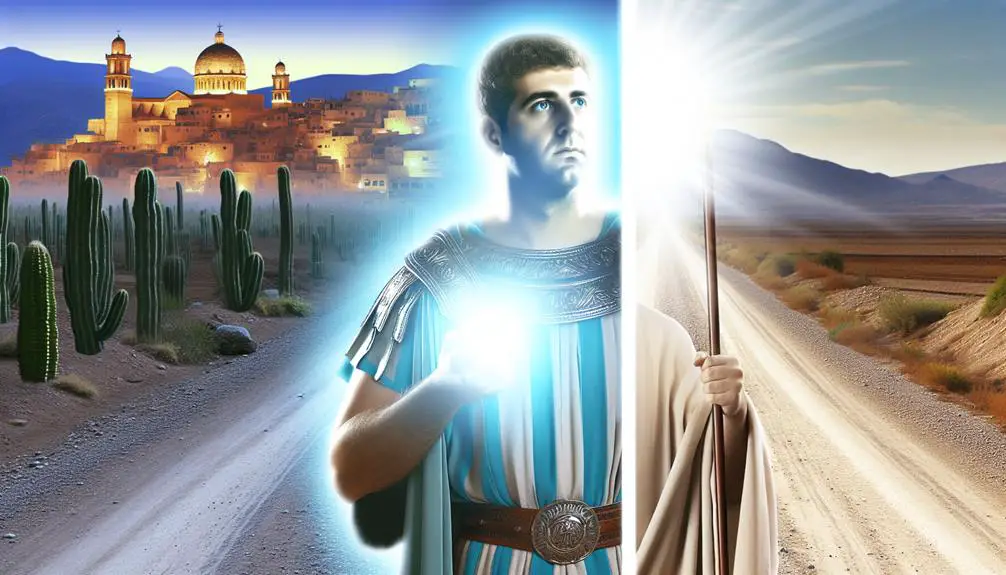Yearn to discover how over 3,000 biblical figures were divinely guided, and find timeless lessons in their transformative journeys with God.

People That God Used in the Bible
Did you know that over 3,000 people are named in the Bible, each with a unique story of how they were used by God?
You'll find that these accounts aren't just ancient history; they offer timeless lessons on obedience, courage, and transformation. From Noah's unwavering faith amidst universal disbelief to Paul's radical turnaround from persecutor to apostle, their stories remain profoundly relevant.
As we explore a few of these lives, you'll discover how their journeys can inspire your own path, nudging you closer to understanding the depth of character and faith required to be used by God.
What might you learn from their experiences that applies to your life today?
Key Takeaways
- Individuals like Noah, Moses, Esther, David, Mary, and Paul were chosen by God to fulfill divine purposes.
- Their stories illustrate the concepts of obedience, faith, courage, and transformation under divine guidance.
- Key moments such as Mary's Immaculate Conception and Paul's conversion highlight the power of divine intervention and personal transformation.
- These biblical figures exemplify how adherence to God's will can lead to significant impacts, showcasing the transformative power of faith and obedience.
Noah: Obedience Amidst Disbelief

Despite widespread skepticism, Noah's unwavering obedience to God's command exemplifies profound faith and trust in divine guidance. In a time when moral decay had engulfed society, Noah stood as a beacon of righteousness, tasked with an unimaginable assignment: ark construction amidst impending global flood. This narrative, far from being a mere ancient tale, serves as a poignant illustration of unwavering commitment to one's faith, even in the face of apparent absurdity.
The construction of the ark, a monumental endeavor, wasn't just a testament to Noah's carpentry skills but, more importantly, his absolute trust in God's word. Skeptics may have mocked, yet Noah's dedication didn't waver. This act of building, in preparation for a cataclysmic flood, underscores a critical theological insight: obedience to divine instruction is paramount, regardless of societal derision or disbelief.
Analyzing Noah's story, it's evident that his life serves as a profound lesson in faithfulness amidst adversity. The global flood, a divine response to humanity's wickedness, demanded an extraordinary level of compliance and faith from Noah. His response, characterized by steadfast obedience and meticulous ark construction, not only ensured his survival but also symbolized the possibility of redemption and new beginnings for humanity.
Moses: From Exile to Deliverer
Transitioning from a life of obscurity in the desert, Moses emerges as a pivotal figure, chosen by God to liberate the Israelites from Egyptian bondage. His encounter with the divine at the burning bush marks a turning point, not just in his life, but in the history of the Israelites. Here, Moses receives a mandate from God, a mission that seems insurmountable. Yet, it's through his unwavering faith and obedience that he accepts this call, despite his initial reluctance and perceived inadequacies.
Moses's return to Egypt sets the stage for a dramatic showdown with Pharaoh. The narrative reaches its climax with the Egyptian plagues, a series of divine interventions that showcase God's power over the gods of Egypt. Each plague escalates in severity, culminating in the Passover, which symbolizes not only the Israelites' liberation but also the establishment of their covenant relationship with God. Moses's leadership through these events underscores a profound truth: God chooses and uses flawed individuals to fulfill His purposes. Through Moses, we see the embodiment of faith in action, a testament to what can be accomplished when one aligns with the divine will.
Esther: Courage for Such a Time
You'll find Esther's story remarkable, not just for her audacious decision but for how she strategically used her royal status to influence outcomes. Her courage, underpinned by faith, showcases a pivotal moment where victory wasn't assured but fiercely pursued.
This analysis will explore how Esther's actions serve as a testament to the power of divine guidance and personal bravery in the face of daunting adversity.
Esther's Brave Decision
How did Esther's unwavering courage position her as a pivotal figure for such a time in biblical history? Amidst the intricacies of Persian politics and the rarity of female leadership, Esther's story stands out. Her decision to approach King Xerxes, despite the potential for death, highlights her remarkable bravery and faith.
- Navigating Persian Politics:
- Esther utilized her understanding of court dynamics, demonstrating strategic patience.
- Embracing Female Leadership:
- Her role challenged societal norms, paving the way for future generations.
- Exemplifying Faith:
- Esther's trust in God was evident, guiding her actions amidst uncertainty.
- Acting Decisively:
- Her choice to intervene saved her people, showcasing the power of individual courage in altering the course of history.
Royal Influence Exercised
Building on Esther's unwavering courage, let's explore the significant impact of her royal influence, exercised with wisdom and conviction at a critical moment in biblical history. Just as King Solomon's wisdom drew the Queen of Sheba to visit, Esther's discernment and strategic action within the palace walls underscore the profound effect that God-ordained leadership can have.
Her story isn't merely one of personal bravery but also illustrates the broader theme of divine orchestration through those in positions of power. By analyzing Esther's approach, you'll recognize a pattern seen throughout scripture: God's use of wise and courageous individuals to fulfill His purposes.
Esther's narrative, much like Solomon's interaction with the Queen of Sheba, highlights the potential for significant spiritual and societal transformation when godly wisdom is applied in governance.
Victory Through Faith
In examining the pivotal role of faith in Esther's story, it becomes clear that her unwavering belief and trust in God's plan were instrumental in securing a victory not just for herself, but for her entire people during a time of existential threat.
- Faith's Reward: Esther's courage, rooted in faith, led to the deliverance of her people, showcasing the profound impact of trusting in a higher plan.
- Overcoming Doubt: Despite the uncertainty of her situation, Esther's faith allowed her to overcome doubt and fear, acting decisively.
- Strategic Faith: Her faith wasn't passive; it propelled her to take strategic actions, demonstrating that faith and works go hand in hand.
- Collective Faith: Esther's story encourages a collective faith, illustrating how individual trust in God can galvanize a community for a common cause.
David: A Shepherd King

David's journey from shepherd to king exemplifies his unwavering faith and God's providential guidance in his life. Notably, his faith was put to the test in his youth, during Goliath's defeat. This event was not just a testament to David's bravery but also to his deep trust in God's power over seemingly insurmountable odds. Furthermore, David's authorship of many Psalms highlights his profound relationship with God, expressing his fears, hopes, and gratitude.
Aspect |
Description |
Significance |
|---|---|---|
Goliath's Defeat |
A young David, armed with faith and a sling, defeats the Philistine giant. |
Demonstrates God's strength in David. |
Psalm Authorship |
David writes many Psalms, articulating a wide range of human emotions. |
Reflects David's deep faith. |
Shepherd to King |
David's rise from a humble shepherd boy to the King of Israel. |
Shows God's providential guidance. |
Covenant with God |
God establishes an everlasting covenant with David, promising a dynasty. |
Ensures the continuation of faith. |
David's life, marked by his roles as shepherd, warrior, king, and psalmist, serves as a multifaceted example of how faith and dedication to God can lead to profound outcomes, even amidst trials.
Mary: Mother of the Messiah
Just as David's life showcases God's ability to guide and uplift, Mary's story, as the Mother of the Messiah, reveals her unique role in fulfilling divine prophecy and her exemplary faith amidst extraordinary circumstances. Her life begins with the immaculate conception, setting the stage for her to become the mother of Jesus Christ. This foundational aspect of her identity is crucial in understanding her purity and preparedness for her divine role.
Consider these pivotal moments in Mary's life:
- Immaculate Conception: Unlike any other human, Mary was conceived without original sin, preparing her from the very beginning for her role in salvation history.
- Angelic Visitation: The angel Gabriel's announcement that she'd bear the Son of God highlights her chosen status and her acceptance of God's will with the words, 'Let it be to me according to your word.'
- Faith Under Pressure: Despite societal challenges and personal uncertainties, Mary's faith never wavered, illustrating her trust in God's plan.
- Spiritual Legacy: Mary's obedience and faithfulness set a precedent for Christian discipleship, emphasizing humility, faith, and devotion to God's will.
Mary's story isn't just historical; it's a testament to faith, obedience, and the fulfillment of divine prophecy, serving as an enduring example for all believers.
Paul: A Transformation Story

Transforming from Saul, a fervent persecutor of Christians, to Paul, a foundational apostle of the Church, illustrates one of the most dramatic spiritual metamorphoses documented in the Bible. This transition wasn't merely a change of name, but a profound conversion of heart and purpose. Saul's encounter on the Damascus road serves as a pivotal moment in Christian history, marking the persecutor converted into a proponent of the faith he once sought to destroy.
Before this encounter, Saul was notorious for his relentless pursuit of Christians, participating in their persecution and even execution. However, the Damascus road experience, where he was struck blind and heard the voice of Jesus asking, 'Saul, Saul, why do you persecute me?' (Acts 9:4), initiated a transformation that would redefine his life's mission.
This moment of divine intervention didn't just stop at restoring his sight; it opened his spiritual eyes, enabling him to see the truth of the gospel he'd previously rejected. Paul's subsequent ministry, marked by his tireless preaching, numerous missionary journeys, and significant contributions to the New Testament, underscores the magnitude of his conversion. His life vividly demonstrates that profound change is possible, serving as an enduring testament to the power of divine grace to transform even the most unlikely individuals.
Frequently Asked Questions
How Did the Unique Cultural and Historical Contexts of Each Biblical Figure Influence Their Actions and Decisions?
You're exploring how cultural adaptation and historical accuracy shape actions and decisions. Each figure's era and society informed their choices, impacting their story's unfolding.
Their backgrounds, societal norms, and historical events directed their paths, reflecting the era's beliefs and challenges. By understanding these influences, you gain insights into their motivations, showcasing the complex interplay between individual agency and cultural-historical contexts, enriching your comprehension of their legacies.
In What Ways Did the Personal Weaknesses or Flaws of These Biblical Characters Play a Role in Their Stories and God's Plans for Them?
You'll find that personal weaknesses often serve as the bedrock for growth and transformation.
In examining flawed leadership, it's evident how these imperfections not only humanize individuals but also highlight the necessity of divine intervention.
This interplay between human fallibility and supernatural guidance underscores a profound truth: limitations can catalyze one's journey towards fulfilling their potential, illustrating a divine blueprint where faults become the very foundation of strength and wisdom.
Are There Archaeological or External Historical Evidences That Corroborate the Stories of These Individuals in the Bible?
You're delving into whether archaeological methodologies or external historical records can verify the stories of certain individuals. It's crucial to approach this with a blend of analytical rigor and scholarly integrity, balancing faithfulness to texts with a quest for historical authenticity.
While evidence varies, some findings align with biblical narratives, offering fascinating insights. However, the extent of corroboration differs, highlighting the complexities in bridging ancient texts and archaeological discoveries.
How Have Interpretations of These Biblical Characters' Stories Evolved Over Time in Different Christian Denominations and Traditions?
In the vast universe of Christian thought, interpretation debates about scriptural narratives have been as dynamic as a blockbuster movie plot.
Over centuries, denominational perspectives have dramatically shaped and reshaped the understanding of these stories.
Each tradition, armed with its unique theological lens, has dissected, analyzed, and reinterpreted the narratives, ensuring a rich tapestry of faith that's both scholarly and deeply faithful, yet endlessly varied in its portrayal and appreciation of these timeless tales.
What Psychological Insights Can We Gain From Understanding the Emotional and Mental Challenges Faced by These Figures in Their Respective Narratives?
When you explore the emotional and mental challenges in narratives, you gain insights into emotional resilience and the stress of leadership. Analyzing these stories reveals how individuals navigate adversity, highlighting the importance of inner strength and the impact of stress on decision-making.
This scholarly approach allows for a deeper understanding of the human condition, showing how faithfulness can guide one through trials, enriching your comprehension of resilience and leadership pressures.
Conclusion
In the tapestry of divine narrative, these individuals stand as testimonies to a higher calling, each thread weaving a story of profound transformation and unwavering faith. Their journeys, marked by trials and triumphs, remind us that in the grand design, even the most unlikely heroes can cast long shadows.
Through their lives, we're invited to ponder our own place within this celestial blueprint, encouraging us to navigate our paths with the same courage, obedience, and heart.



Sign up